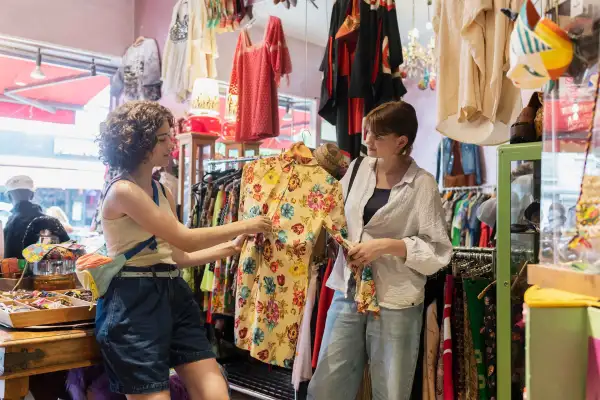How to Shop More Ethically — Without Breaking the Bank

In 2025, when just about any item imaginable can be bought online and delivered to your doorstep — sometimes in mere hours and oftentimes by an app-based gig worker without health insurance — the movement to become a more ethical consumer has never been more pressing.
Putting your money where your mouth is, however, is no easy feat in the U.S. Experts who spoke to Money say that breaking the cycle of instant gratification and overreliance on cheap, unsustainable products can feel overwhelming at first.
“It’s really easy to get decision paralysis,” says Tanja Hester, author of Wallet Activism: How to Use Every Dollar You Spend, Earn and Save As a Force for Change.
But you don’t have to be perfect, she tells Money. Just a few changes to your purchasing habits can go a long way. More good news: These changes don’t have to break the bank, either.
What do you value?
In Wallet Activism, Hester lays out a framework that helps people overcome the daunting hurdle of aligning your finances and your philosophy. To her, it's is less about optimizing every single choice you make and more about a broader reframing of your relationship with your money.
And experts say that injecting a little bit of mindfulness is key. Once you learn to pause for a second and reflect before you buy — that’s when you can ensure that your values are reflected in your purchases.
Granted, each person values different things. So before you dive headfirst into specific shopping strategies, you should think about what is most important to you and how that might relate to how you want to spend your money.
“Shopping ethically is in the eyes of the consumer,” says Irit Tamir, senior director of corporate engagement at nonprofit advocacy group Oxfam America.
For instance, do you want to support environmental sustainability, worker rights, social justice, local businesses — or simply shop at places that don’t donate to politicians you disagree with?
In many cases, there’s a lot of overlap. But not always. Having clear, explicit values and goals in mind can help you simplify your decision making. And Hester, for one, is a huge fan of simplification.
(This story is part of Money's February issue on managing your money in Trump's America.)
Changing your shopping habits
Here’s the part where the stories we tell ourselves about who we are and whether our choices matter typically impede any progress.
If you’ve spent any time discussing how American consumerism impacts society, you may have heard the refrain “there’s no ethical consumption under capitalism.”
It’s usually pointing out that somewhere along the supply chain of the goods that are available to us, someone is getting exploited, or some pollution is damaging the environment.
Hester says that while that phrase is probably true, it shouldn’t be used as a way to shrug your shoulders and not strive to forward the values that you hold dear.
Collectively, she argues, your financial decisions can make a real impact. They may even feel a little cathartic.
“We’ve got a situation where our leaders are failing to act to address the biggest challenges facing us,” she says. “It’s very reasonable as an individual to say, ‘Okay, but what can I do?’ And a big part of what each of us can do really has to do with our financial choices.”
Buying less stuff
Experts say that a major starting point when trying to become a more ethical consumer — as oxymoronic as it may sound — is simply not buying stuff.
“People often forget that buying less is one of the best things you can do in terms of sustainability,” says Alex Crumble, a researcher at the UK-based non-profit cooperative Ethical Consumer Research Association. “It's also good for your bank balance.”
Of course, he adds, that doesn’t mean you need to deny yourself essential items or things that bring you joy. But simply put: “Most of us consume too much.”
Hester also emphasizes that this isn’t an austerity measure. The “stuff” category should include random items that you don’t necessarily need, especially cheap items that could harm the environment, exploit workers or both. Buying fewer tangible objects is “a low hanging fruit in terms of ethical financial decision making,” she adds.
Making mindful purchases
That moment of reflection before you put the item in your cart comes into play when choosing what items you truly need.
Hester’s book offers up a few useful questions to ask yourself at this stage.
- For whom? As in, who benefits from this action? Who’s harmed? Is it in the best interest of most people (or in this case — your chosen value)?
- Can everyone do this? Hester gives the example of buying a new Patagonia jacket. It's a sustainable jacket from a socially responsible company... But it's expensive. Not everyone can afford this option. (On top of that, it’s a new item. By the very nature of it being new, it will have more of an environmental impact than going with a used jacket that will likely be much cheaper.)
- Is it too cheap? If a new item is very cheap, that could be emblematic of poor quality, and the company may be taking advantage of its workers, the environment or both.
- What am I funding? What world is the company, corporation or organization that is offering the item trying to create? Do you support that vision?
Not every question applies to all situations, she notes, but at least one will. And these questions can drastically simplify your decision making without a ton of niche knowledge needed to decode various labels, certifications or advertising claims.
Another question that Tamir with Oxfam would add to that list: Is there a way for you to purchase it used? As with simply refraining to buy an item, purchasing something used can save you money and reduce your environmental impact.
She says due to their national footprint, the nonprofits Goodwill and Salvation Army are a natural place to start, but there are countless other local nonprofit organizations and thrift stores that offer used items.
Apps are swooping in to follow this trend, too. You can find deals on used clothes on Poshmark or Depop. For all kinds of home goods and appliances, Facebook Marketplace and NextDoor offer ample ways to buy or trade goods with your neighbors.
If there is no used version of the item available, consider purchasing it from a local business over a big box retailer. Of course, there are situations where the item may not otherwise be available. Experts say not to beat yourself up if you do need to rely on big corporations sometimes. Again, you don’t need to be striving for perfection.
What to avoid
When trying to make more ethical decisions with your money, experts say there are unfortunately few shortcuts. It will take some time and research upfront to learn how to better align your purchasing habits with your personal beliefs.
Still, some advice from the experts who spoke with Money broadly applies to almost all situations. Here are a few quick tips on what to avoid as you’re striving to shop more ethically in 2025.
Fast delivery
Regardless of what you’re buying, choosing the quickest delivery option should be avoided unless it’s absolutely necessary.
Tamir says that the culture of delivery at break-neck speeds puts tremendous pressure on warehouse workers, who are increasingly getting injured and suffering from mental and physical exhaustion.
According to the Department of Labor, over 250,000 warehouse and delivery workers have been injured annually in recent years. Amazon workers make up a disproportionately high share of those injuries.
“There’s someone on the other end of that package that has to do the work,” she says. “They’re being expected to work like robots.”
So if there’s an option to deliver the package in a few days — as opposed to same or two-day delivery — choose that one. And if there isn’t that option, Tamir recommends to actually engage with the company and tell them you’d like a slower delivery option.
“They actually do listen to consumers,” she says. “At the end of the day, that’s what they care most about.”
Bogus claims from companies
One of the reasons shopping ethically can be so difficult is because companies are misleading with their ads, packages and even certifications.
As Hester writes in Wallet Activism, phrases like “organic ingredients,” “handmade,” “sustainably sourced” mean little to nothing and are often signs of corporations trying to appear more environmentally or socially responsible than they are — aka greenwashing.
Even if the package appears to have some sort of certification, not all of them are created equally.
One example of a reputable label Tamir recommends looking for is called Living Wage for US, a nonprofit that certifies companies who provide their U.S. workers with fair pay and benefits. As for food, Tamir also highlighted the Equitable Food Initiative, an organization that not only certifies that growers and farm workers are treated ethically but also partners with food distributors to train their workers in equitable practices.
Hester’s book also includes an appendix that breaks down several popular and notable certification programs, including USDA Organic (the government standard for organic food and farming); LEED (for energy-efficient, green buildings); Leaping Bunny (a seal that denotes the company does not test on or harm animals at any stage of production) and several others.
Hester also says you’ll have to trust your gut sometimes. A product might say it’s environmentally friendly — and even have certifications on the packaging — but if the item is primarily plastic, for instance, there’s no way for it to actually be harmless for the environment. In that case, she recommends opting for a different material.
Perfectionism
As you try to implement some of these ethical strategies into your financial life, experts underscore that you shouldn’t view them as unbreakable tenets. They’re guidelines to, hopefully, help you live a more fulfilling life that aligns with your values.
Keep in mind that sometimes the most ethical option is simply unavailable. Or if it is, it’s just not realistic for you to implement. The key is to find a balance that improves your current habits without sending you into debt.
“Ultimately, do the best you can, and don't feel bad if you don't feel you can afford the 'more ethical' option,” says Crumble. “But also remember that there may be an ethical option that is actually cheaper than the 'normal' option.”
More from Money:
The Everyperson's Guide to Making Money in Trump's America
Having This Shopping Habit Means Your Finances Are Probably a Mess
A Political Battle Over ESG Investing Is Heating Up. Here’s What It Could Mean for Your 401(k)

